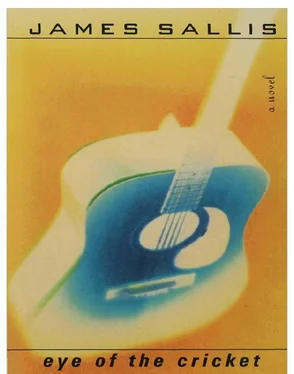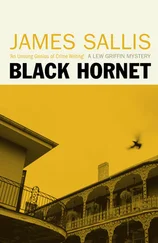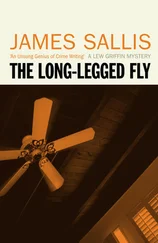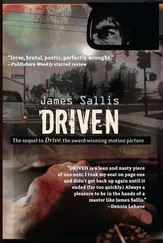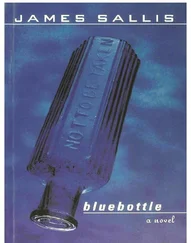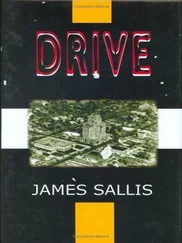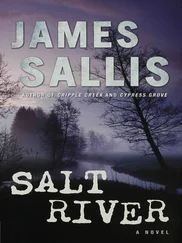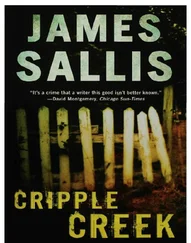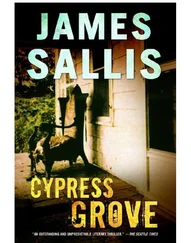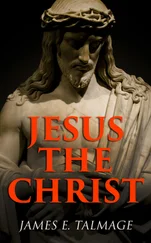James Sallis - Eye of the Cricket
Здесь есть возможность читать онлайн «James Sallis - Eye of the Cricket» весь текст электронной книги совершенно бесплатно (целиком полную версию без сокращений). В некоторых случаях можно слушать аудио, скачать через торрент в формате fb2 и присутствует краткое содержание. Жанр: Криминальный детектив, на английском языке. Описание произведения, (предисловие) а так же отзывы посетителей доступны на портале библиотеки ЛибКат.
- Название:Eye of the Cricket
- Автор:
- Жанр:
- Год:неизвестен
- ISBN:нет данных
- Рейтинг книги:3 / 5. Голосов: 1
-
Избранное:Добавить в избранное
- Отзывы:
-
Ваша оценка:
- 60
- 1
- 2
- 3
- 4
- 5
Eye of the Cricket: краткое содержание, описание и аннотация
Предлагаем к чтению аннотацию, описание, краткое содержание или предисловие (зависит от того, что написал сам автор книги «Eye of the Cricket»). Если вы не нашли необходимую информацию о книге — напишите в комментариях, мы постараемся отыскать её.
Eye of the Cricket — читать онлайн бесплатно полную книгу (весь текст) целиком
Ниже представлен текст книги, разбитый по страницам. Система сохранения места последней прочитанной страницы, позволяет с удобством читать онлайн бесплатно книгу «Eye of the Cricket», без необходимости каждый раз заново искать на чём Вы остановились. Поставьте закладку, и сможете в любой момент перейти на страницу, на которой закончили чтение.
Интервал:
Закладка:
"You do remember that Reagan fellow?" James Lee said when his turn came. He'd taught for years at Xavier, history and economics; everyone called him Professor. "One of the true heroes of our cause. 'Long with Jesse Helms, of course."
America's memoiy is short. Abjuring any sense of history, the nation eternally improvises itself. Highwaymen such as Richard Nixon disappear only to emerge years later as "elder statesmen." A presidential candidate recently refened to Ronald Reagan as the best president this country ever had. All over America, jaws dropped. But (and this is the amazing part) just as many didn't.
"Yassuh, we be retired, the mosta us," one of the company said. Fishing a beer from the tub, he opened it. It spewed, provoking general laughter.
"What we are all right."
"Retired."
"Tired and tired again."
"Like that beer. Make some rude noise, then go back to what we can't help being."
"American-dream word, ain't it, retired?"
All those big words that make us so unhappy. Stephen Daedalus was right to fear them.
"Some day these fish ain' bitin'-"
"Thass most days, Sheldon."
"You right, ole man."
"— we goan hafta study collectin all them words. Make us up a list. Regular devil's dictionaiy.?" — quality. Z)e-mock-racy. Damn. Just roll right the tongue, don't they?"
"They do for sure."
More than one voice: "Yeah!"
We'd cut right to call and response, echoes of talking drums in Congo Square and church amens, the slapshot syllogism at the heart of the blues.
"You want this last piece a chicken, Lewis?" Sam the barber said.
"Think we all 'bout had our fill."
One last volley, then: "Life, liberty-"
"And the pursuit of happiness."
"You mean haplessness, don't you, Eugene?" The Professor's eyes met mine. We were both in hiding-in plain sight, like Poe's purloined letter.
By this time chickens were nibbled down to dry bone, beer had become a couple dozen empty cansfloatingin tepid water and fish (if indeed they'd ever entertained such a notion) had given up biting. The day itself, ebbing away in pink-and-gray dribbles on the horizon, abandoned all illusion, all pretense: knew once again it wouldn't survive. The group began dispersing. I bade them good-bye.
Then, following river's bend into what used to be called the Irish Channel, I wound up (like Jesus) among thieves.
Back doors of nondescript vans open in an abandoned school parking lot, these maverick capitalists gathered over their latest takes: trading, bartering, buying and selling, avidly redistributing wealth. From time to time kids pedaled up on bicycles with baskets full of goods and pedaled away again with baskets empty.
TVs were a major commodity, as were portable stereos, VCRs, CD players and boom boxes.
Lots of laptop computers these days, I noticed. Larger systems, proving difficult both to transport and to fence, generally stood untouched, but the little ones were fair game, negotiable. New technology, new crimes.
I thought how Newt Gingrich some years back told us flat out that all our country's problems would be solved once information became freely accessible on the Internet. Such sweetness to what he said, in a way: this blind, ever-renewable innocence at America's heart. The man simply could not imagine that other lives might be different from his own. One journalist looked over at the housing project across the street, wondering aloud how many of the residents had their computers turned on just then.
I slept that firstnight under a bench in a pie-slice park on Magazine, my bench and two others, a border of hedge and an anonymous statue pretty much comprising it. Directly across Magazine, used furniture stores stood shoulder to shoulder, tanklike steel desks and Formica dinette sets showing dimly through windows cataracted with grime. A bar took up the V's other leg, HALF MOON painted freehand on its blacked-out window, sign above the doorreading THE PLACE. Chains were wound through the square bars of a security gate whose lock no longer worked. Drifts of refuse and leaves at the gate's base bore witness to long disuse.
Early morning-I'd stepped out of time's circle, gone to Hopi Mean Time like Doo-Wop, give-and-take of light and body's promptings my only calendar or clock-I woke to the sound of a car idling nearby and a voice above me.
Policeman squatting there, face through the bench's slats looking all of sixteen years old. Telling me I'd best move along. Partner in the car watching, hands wrapped around a plastic cup of Circle K coffee.
"You okay, sir?"
Sir? I guess some things do change.
I nodded.
"You heaixl me, right?"
I began climbing out from under the bench, stiff and sore from the day's walking as much as from the night's cramped position.
"You need help? You walk okay?"
No. Yes.
"Better hit it, then. Store owners'll start showing up soon, don't much like campers. Be on the phone in three minutes and we'd be rightback down here."
I stood, one hand on the back of the bench. Not too steady at all. Legs simultaneously numb and knotted with cramps. Absurdly thinking of Reagan in some old movie: My legs, what happened to my legs?
"Hey, you sure you're okay? When's the last time you ate? Don't know how you guys pull it off. Here." He handed me a five."But it's for food, right? Nothing else."
I thanked him.
"No problem. Listen, you take care, okay?"
He got back in the car. The radio crackled. They had the air cranked up high. He and partner sat watching as I moved away down Magazine. The street turned one-way and empty here. No one coming uptown this time of day. The whole city might be deserted. Lifeless husks of cars, shells of buildings. I was the only one left alive.
31
Later that morning as I walked by an empty lot on lower Prytania where an impromptu flea market had sprung up, cars, wooden pushcarts and shopping carts spilling out lines of tools, cardboard boxes of record albums, ground cloths or improvised tables laid with waffle irons, hot dog cookers and coconuts turned into heads with shells for eyes, I thought how much of my life these past forty-plus years, since I came to New Orleans, had been passed simply moving through the city, watching it close and reopen like some huge wood-and-stone flower around me, forever new, forever the same; and how much, on the other hand, passed as I sat afloat, apart and alone, a distracted Archimedes, in my room.
All these years I'd believed I understood the city's real life-conceit of the worst sort. Whole generations of change had passed outside, fogging the glass with their breath as they peered in, some of them knocking at the pane, as I sat writing my own books and reading others, sunk in the dailiness of my life. Pascal claimed that all man's unhappiness arises from the single fact that he is unable to remain quietly in his own chamber. Hedging the bet again.
Appropriately enough, I thought of Hamsun's Hunger, how on a gloomy, wet morning the novel's protagonist departs with his few yet-unpawned possessions rolled into a blanket, promising in a note left behind to his landlady that soon enough, away from these distractions and with time to scribble out a scatter of feuilletons for the local paper, he'll remit not only her due but a handsome interest as well.
I thought, too, of the immense sadness of Rimbaud's last letter, dictated to his sister the day before his death. I imagine her at bedside, taking this down, then, as Arthur falls back into pure delirium (I smell her soap-washed body, the stench of his decomposing leg and sour, acid sweat, unguents and incense set out to cover these), stepping to the door where Mother waits, saying, Perhaps he will rest now. I wish to change today from this steamship service, which I do not even know the name of, but in any case let it be the Aphinar line. All those lines are everywhere here; and I, powerless, unhappy, can find nothing; the first dog you meet in the street will be able to tell you. So send me the list of fares from Aphinar to Suez. I am completely paralysed: therefore I wish to be embarked early. Tell me at what time I must be carried on board.
Читать дальшеИнтервал:
Закладка:
Похожие книги на «Eye of the Cricket»
Представляем Вашему вниманию похожие книги на «Eye of the Cricket» списком для выбора. Мы отобрали схожую по названию и смыслу литературу в надежде предоставить читателям больше вариантов отыскать новые, интересные, ещё непрочитанные произведения.
Обсуждение, отзывы о книге «Eye of the Cricket» и просто собственные мнения читателей. Оставьте ваши комментарии, напишите, что Вы думаете о произведении, его смысле или главных героях. Укажите что конкретно понравилось, а что нет, и почему Вы так считаете.
